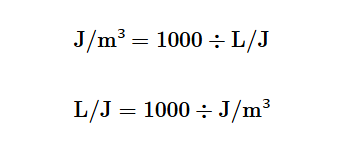Energy Density Converter - L/J to J/m³ Calculator
How to Convert Energy Density
The Energy Density Converter calculates the equivalent energy density between liter per joule (L/J) and joule per cubic meter (J/m³) using the following conversion factors:
From L/J to J/m³:
\( \text{J/m³} = 1000 \div \text{L/J} \)
From J/m³ to L/J:
\( \text{L/J} = 1000 \div \text{J/m³} \)
Where:
- \( \text{L/J} \): Liter per joule, a unit of inverse energy density, representing volume per unit energy, used in specific scientific applications.
- \( \text{J/m³} \): Joule per cubic meter, a metric unit of energy density, measuring energy per unit volume, common in engineering.
Enter the energy density value and select the unit to convert between L/J and J/m³. Note: Conversion is undefined for an input of 0 due to division by zero.
Using the Energy Density Converter
This converter is designed to assist with converting between L/J and J/m³, useful in fields like physics, engineering, and energy analysis.
Input the energy density value and select the unit (L/J or J/m³). The calculator will display the converted values in both units.
Example: Convert 2 L/J to J/m³.
- Energy Density: \( 2 \, \text{L/J} \)
- Conversion: \( 1000 \div 2 = 500 \, \text{J/m³} \)
- Result: \( 2 \, \text{L/J} = 500 \, \text{J/m³} \)
Use this tool for quick and accurate conversions in scientific and engineering applications.
Common Conversion Table
The following table provides quick reference conversions for common energy density values between L/J and J/m³:
| L/J |
J/m³ |
| 1 |
1000 |
| 2 |
500 |
| 5 |
200 |
| 10 |
100 |
| 20 |
50 |
Use this table for quick lookups or to verify calculator results.
Common FAQ
Below are frequently asked questions about energy density conversions between L/J and J/m³:
- Q: What is the difference between L/J and J/m³?
A: L/J (liter per joule) measures volume per unit energy (inverse energy density), while J/m³ (joule per cubic meter) measures energy per unit volume (energy density). Since 1 L = 0.001 m³, 1 L/J = 1000 ÷ (1 J/m³).
- Q: Why convert between L/J and J/m³?
A: Conversions are needed in physics and engineering, where L/J is used for inverse energy density in specific calculations, and J/m³ is standard for energy density in metric systems.
- Q: How accurate is this converter?
A: The converter uses the precise reciprocal relationship (J/m³ = 1000 ÷ L/J) and provides results rounded to 6 decimal places for L/J and 5 for J/m³, ensuring high accuracy, except for zero inputs which are undefined.
- Q: Can negative values be converted?
A: Yes, the converter handles negative values, which may be relevant in specific theoretical contexts, and performs conversions accurately.
- Q: Are there other units for energy density or inverse energy density?
A: Yes, units like m³/J, Btu/ft³, or kJ/m³ are used, but this calculator focuses on L/J and J/m³, relevant for scientific applications.
 Home
Home
 Back
Back
